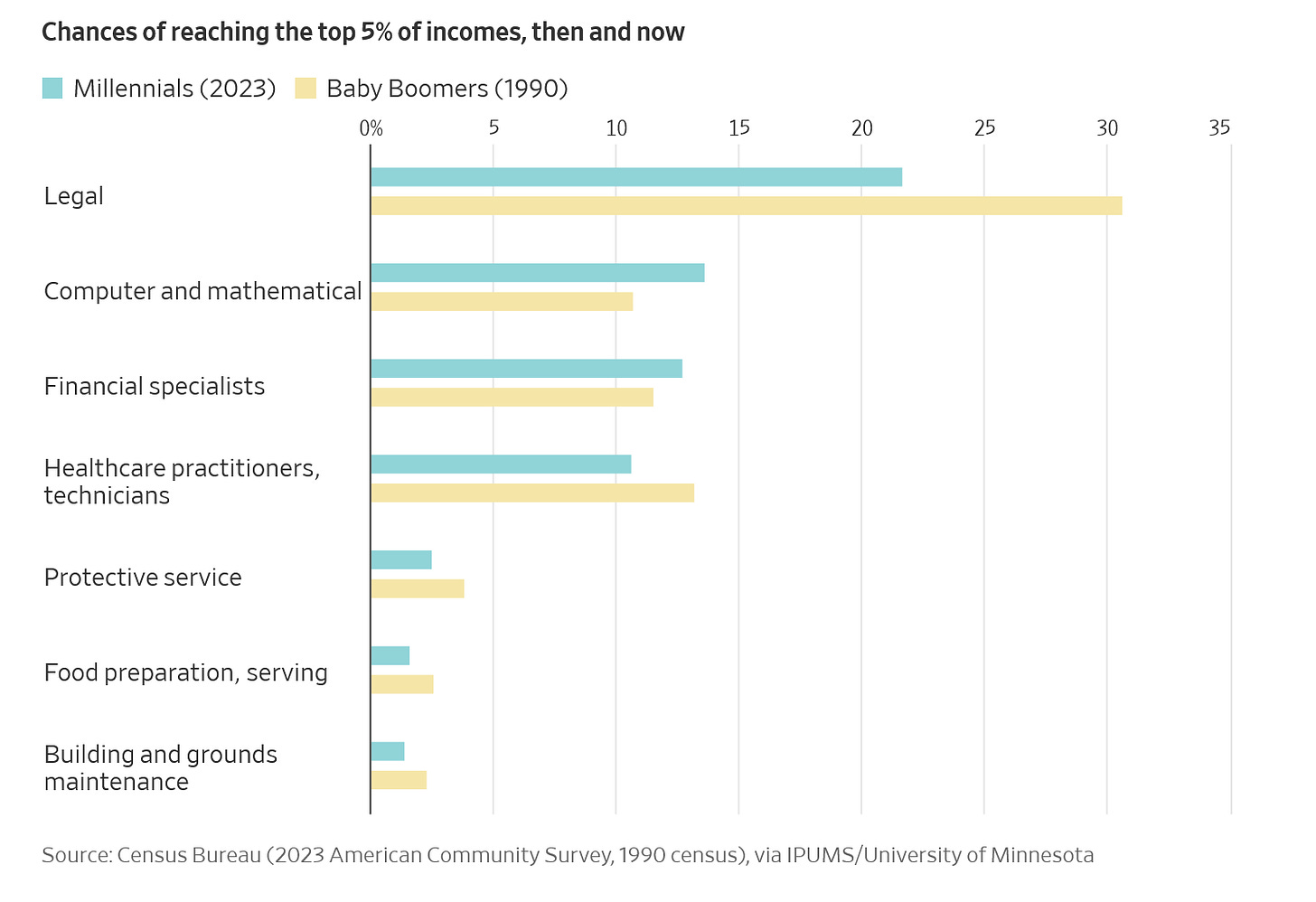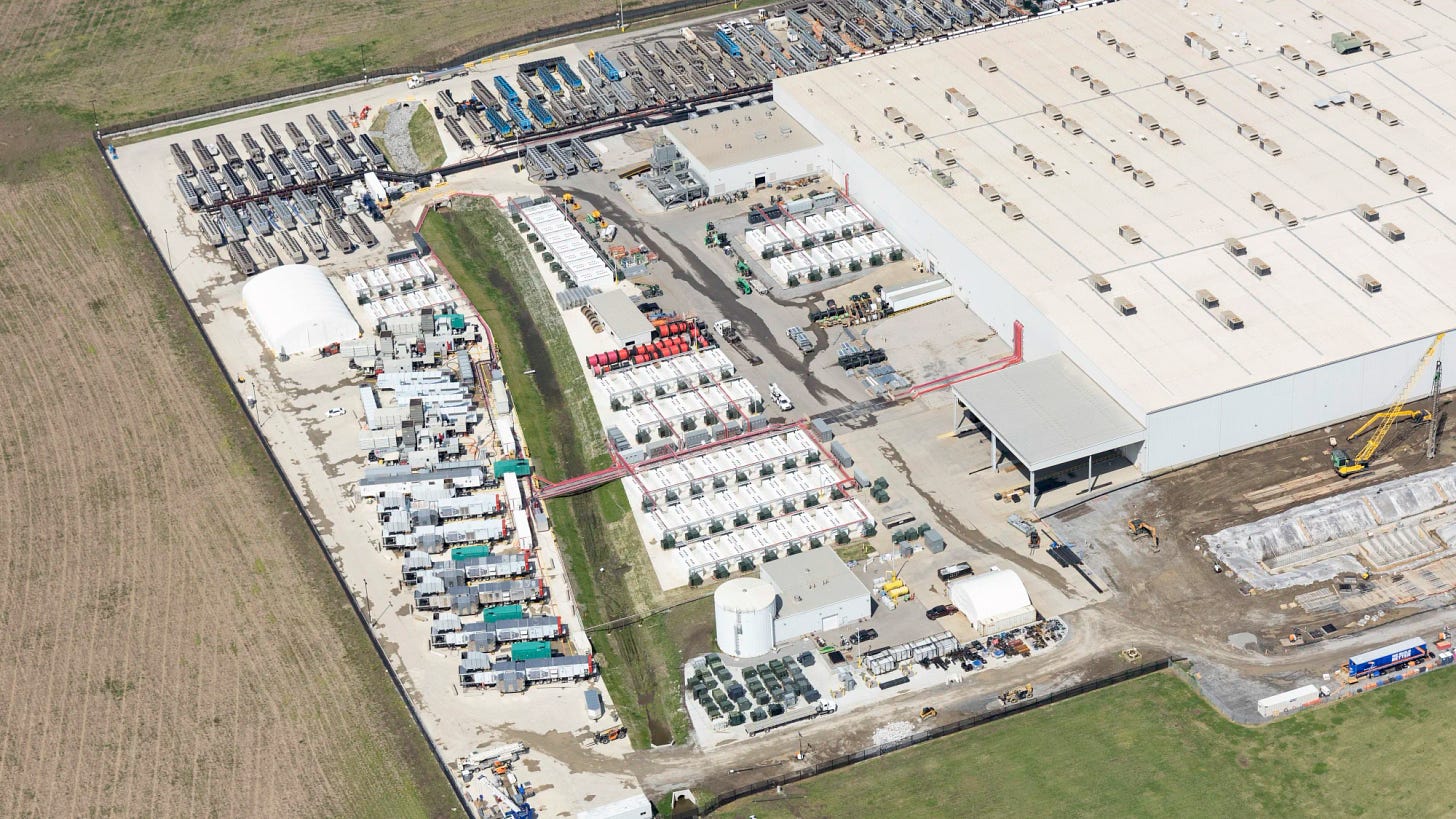Weekly Grounding #96
News, links, writing
Weekly Groundings are published every Friday to highlight the most interesting news, links, and writing I investigated during the past week. They are designed to ground your thinking in the midst of media overload and contribute to Handful of Earth’s broader framework. Please subscribe if you’d like to receive these posts directly in your inbox.
If you’re already subscribed and want to help the publication grow, consider sharing Handful of Earth with a friend.
“How the Highest-Earning Millennials Made It to the Top of Their Generation”
The Wall Street Journal reports on how the top 5% of Millennial earners made their way to this elite economic status. The report notes that “Millennials who become top earners are taking strikingly similar paths to get there. They are often working in a small number of lucrative fields in a small number of superstar cities after attending a small number of top-tier universities.”
In particular, tech and finance have catapulted this elite cohort toward their high earnings: “This vast economic re-sorting has given a boost to the fields of tech and finance. Both are more likely to vault millennials into their generation’s top 5% of household incomes, compared with baby boomers at similar ages in 1990, according to a Wall Street Journal analysis of the latest Census Bureau data from 2023…Pay grew much faster in higher-wage industries than in lower-wage industries between 1996 and 2018, according to a 2024 study in the American Economic Review. Tech is among the lucrative 5% of fields that accounted for more than half of that difference, along with science, engineering and finance.”
“As millennials have settled into their adult lives, more than a fifth of the generation’s top-earning 5% lives in the tech hubs of California or Washington state. Incomes in a handful of economically vibrant metros including San Francisco and Seattle, as well as New York and Washington, D.C., have pulled away from those in the rest of the country over the past several decade…”
Many of these high earners are elite immigrants: “Chirranjeevi Gopal grew up in Chennai, India, and moved to California for graduate school in 2009. A decade later, he left a secure engineering job to found a battery-materials startup in Silicon Valley. ‘I never thought twice about leaving my country and moving to a country where I didn’t know anybody,’ said Gopal, a 37-year-old in Mountain View, Calif. The Bay Area has attracted so many skilled workers that Gopal said he is now more likely than his wife, Caitlin Bigelow, to run into childhood acquaintances, even though she is a California native.” For more on the problem of elite immigration in the United States, see “I’m One of You Now.”
“Elon Musk Brought ‘The World’s Biggest Supercomputer’ to Memphis. Residents Say They’re Choking on Its Pollution”
CNN reports on one of Elon Musk’s latest high tech projects: “Last summer, an abandoned factory in southwest Memphis got a new life courtesy of the world’s richest man. Elon Musk’s artificial intelligence company xAI moved in to transform this unprepossessing building into the ‘world’s largest supercomputer.’ Musk named it Colossus and said it was the ‘most powerful AI training system in the world.’ It was sold locally as a source of jobs, tax dollars and a key addition to the ‘Digital Delta’— the move to make Memphis a hotspot for advanced technology. ‘This is just the beginning,’ xAI said on its website; the company already has plans for a second facility in the city.”
“But for some residents in nearby Boxtown, a majority Black, economically-disadvantaged community that has long endured industrial pollution, xAI’s facility represents yet another threat to their health. AI is immensely power-hungry, and Musk’s company installed dozens of gas-powered turbines, known to produce a cocktail of toxic pollutants. The company currently has no air permits, appearing to rely on a loophole for temporary turbines—but environmental groups say the exemption does not apply, and residents are angry.”
The report states that “Gas-powered turbines produce pollutants, including nitrogen oxides, a key component of ozone pollution—also called smog—which can cause asthma attacks and chest pain and, in the longer-term, is linked to decreased lung function and premature death. They also generate the carcinogen formaldehyde and tiny air pollution particles so small they can pass through lungs into people’s bloodstream.”
“At Amazon, Some Coders Say Their Jobs Have Begun to Resemble Warehouse Work”
While AI data centers wreak havoc on ecological and human health, AI has begun to degrade the work life of some of its hitherto champions: coders. The New York Times reports that “As A.I. spreads through the labor force, many white-collar workers have expressed concern that it would lead to mass unemployment. But while joblessness has ticked up and widespread layoffs might eventually come, the more immediate downside for software engineers appears to be a change in the quality of their work. Some say it is becoming more routine, less thoughtful and, crucially, much faster paced.”
“Three Amazon engineers said that managers had increasingly pushed them to use A.I. in their work over the past year. The engineers said that the company had raised output goals and had become less forgiving about deadlines. It has even encouraged coders to gin up new A.I. productivity tools at an upcoming hackathon, an internal coding competition. One Amazon engineer said his team was roughly half the size it had been last year, but it was expected to produce roughly the same amount of code by using A.I.”
The article continues: “The automation of coding has special resonance for Amazon engineers, who have watched their blue-collar counterparts undergo a similar transition. For years, many workers at Amazon warehouses walked miles each day to track down inventory. But over the past decade, Amazon has increasingly relied on so- called robotics warehouses, where pickers stand in one spot and pull inventory off shelves delivered to them by lawn-mower-like robots, no walking necessary…The Amazon engineers said this transition was on their minds as the company urged them to rely more on A.I. They said that, while doing so was technically optional, they had little choice if they wanted to keep up with their output goals, which affect their performance reviews.”
“OpenAI Unites With Jony Ive in $6.5 Billion Deal to Create A.I. Devices”
Meanwhile, tech oligarchs push forward with new forms AI technology: “Sam Altman, OpenAI’s chief executive, said the company was paying $6.5 billion to buy IO, a one-year-old start-up created by Jony Ive, a former top Apple executive who designed the iPhone. The all-stock deal, which effectively unites Silicon Valley royalty, is intended to usher in what the two men call ‘a new family of products’ for the age of artificial general intelligence, or A.G.I., which is shorthand for a future technology that achieves human-level intelligence.”
“Mr. Altman and Mr. Ive are effectively looking beyond an era of smartphones, which have been people’s signature personal device since the iPhone debuted in 2007. If the two men succeed—and it is a very big if—they could spur what is known as ‘ambient computing.’ Rather than typing and taking photographs on smartphones, future devices like pendants or glasses that use A.I. could process the world in real time, fielding questions and analyzing images and sounds in seamless ways.”
Altman and Ive’s promotional video for their collaboration is worth a watch to understand just how sheltered, self-congratulatory, and out of touch these figures are:
“The New Dark Age”
At The Chris Hedges Report, Chris Hedges argues that “We are entering a new dark age. This dark age uses the modern tools of mass surveillance, facial recognition, artificial intelligence, drones, militarized police, the revoking of due process and civil liberties to inflict the arbitrary rule, incessant wars, insecurity, anarchy and terror that were the common denominators of the Dark Ages.”
He writes that “Gaza puts to rest the lie of human progress, the myth that we are evolving morally. Only the tools change. Where once we clubbed victims to death, or chopped them to pieces with broadswords, today we drop 2,000-pound bombs on refugee camps, spray families with bullets from militarized drones or pulverize them with tank shells, heavy artillery and missiles…Campaigns of mass killing unleash the feral qualities that lie latent in all humans. The ordered society, with its laws, etiquette, police, prisons and regulations, all forms of coercion, keeps these latent qualities in check. Remove these impediments and humans become, as we see with the Israelis in Gaza, murderous, predatory animals, reveling in the intoxication of destruction, including of women and children. I wish this was conjecture. It is not. It is what I witnessed in every war I covered. Almost no one is immune.”
Hedges concludes: “The genocide in Gaza has imploded the subterfuges we use to fool ourselves and attempt to fool others. It mocks every virtue we claim to uphold, including the right of freedom of expression. It is a testament to our hypocrisy, cruelty and racism. We cannot, having provided billions of dollars in weapons and persecuted those who decry the genocide, make moral claims anymore that will be taken seriously. Our language, from now on, will be the language of violence, the language of genocide, the monstrous howling of the new dark age, one where absolute power, unchecked greed and unmitigated savagery stalks the earth.”
“The Spirit(s) of Our Age”
On a more hopeful note, Rhyd Wildermuth reflects on the spirits of our age at From The Forests of Arduinna: A “zeitgeist is…literally a ‘spirit’ of an age or a time. And when we instead use psychological terms like ‘madness’ or ‘hysteria’ gripping a society or of mass ‘delusions,’ we are speaking of symptoms that until only very recently were thought to have demonic or magical causes. Forces sweep across and through societies like waves and like wind, and these are both likewise ‘material’ forces with unseen agency. You cannot see the wind, only its effects, nor can you pick up and hold a wave in the sea. Yet they both exist, and they both cycle, swelling and ebbing and then swelling again.
He continues: “To look at history—which is to say to look at human lives and the things we do together—this way is not to be a fatalist nor a supernaturalist. It’s not that things are ‘out of our hands’ or that some singular deity has preordained our collective suffering. It’s instead—as with the Tao—to understand what can truly be done and what is only wasted effort. In other words, it’s to look for the cycles, to understand which spirits and which forces are sweeping across our lives, and to then act not against them but rather according to what’s best done in such times.”
What grounded your thinking this week? Share in the comments.




